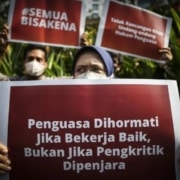
Photo by Portable Soul from Flickr.
The Defending Islam rallies in 2016 and 2017 and the very polarising Indonesian presidential election of 2019 suggest the role of Islam in the 2024 election will be more significant than ever. Increasing expressions of religiosity and its fusion with politics are encouraging presidential candidates to seek endorsement from multiple Islamic clerics and organisations, hoping it will motivate their followers to support their candidacies.
However, the Indonesian Islamic community (umma) is divided into multiple ideological and political allegiances, which mirror those of Indonesian society. Progressive and moderate Islamic leaders and activists – many affiliated with Nahdlatul Ulama (NU), Indonesia’s largest Islamic organisation – tended to support outgoing President Joko ‘Jokowi’ Widodo in the 2014 and 2019 elections.
Meanwhile, Islamists were aligned with his one-time rival, retired General Prabowo Subianto – Indonesia’s current defence minister – during the 2019 elections. They included moderate Islamists like those affiliated with the Prosperous Justice Party (PKS), along with those with more revivalist aims like the Islamic Defenders Front (FPI) and Hizb ut-Tahrir Indonesia (HTI), which seek to turn Indonesia into a state based upon Islamic law in some form.
Both HTI and FPI were formally banned as part of an Islamist crackdown initiated by the Jokowi regime after the Defending Islam rallies. Other Islamist-leaning parties and groups also toned down their radical demands to avoid being targeted by the regime. Likewise, Prabowo seemed to distance himself from his Islamist supporters once he secured a ministry in Jokowi’s government.
NU also became closely aligned with the Jokowi regime’s effort to crackdown on the Islamists, with its militia – Banser – often helping disrupt mobilisation efforts of the Islamists. As reward for its cooperation, NU benefited from legislative and political appointments for its activists, as well as financial patronage in the form of various state projects to promote religious moderation, rural development, and so forth.
Since the 2024 presidential campaign started unofficially last year, Indonesian analysts have predicted Islamists will back Anies Baswedan’s candidacy, given he was elected governor of Jakarta in 2017 with the backing of Islamist activists – notably defeating his predecessor, Basuki Tjahaja “Ahok” Purnama, in controversial circumstances, following Ahok’s jailing for alleged blasphemy.
Similarly, conventional wisdom suggests moderates will back Ganjar Pranowo, the current governor of Central Java, who is nominated by the Indonesian Democratic Party Struggle (PDI-P), the largest Indonesian political party, which counts secular nationalists and moderate Muslims as its core constituencies.
Recently, however, both moderates and Islamist activists seem to be using political pragmatism instead of ideological proximities to select their 2024 presidential nominee. Prabowo – running in his fourth presidential contest – seems to be the main beneficiary of this emerging pragmatism. Despite his ambivalence to Islamist groups after he became a minister, he is seen by many Muslim leaders and activists as a safe candidate who could easily win the election, and so worth backing.
In fact, several influential Islamist politicians have indicated their endorsement of Prabowo. For example, Fahri Hamzah, one of the co-founders of the Gelora Party, has signalled support for Prabowo, stating the former Suharto-era general was a “victim of numerous political betrayals.” Referring to multiple allegations that Prabowo has been involved in human rights abuses, particularly the disappearance of dozens of pro-democracy activists prior to the 1998 Reformasi, Fahri claims “all ‘misunderstandings’ about Prabowo’s [past role] in Indonesia’s history will disappear during the election campaign.” Coming from a senior politician with a huge social media following, this statement suggests Islamist support of Prabowo is no longer taboo.
Prabowo has also made overtures widely perceived as shoring up support from more moderate Islamic groups. In early May, he held a meeting with Muhadjir Effendy, Coordinating Minister for Human Development and Cultural Affairs, which was allegedly an exploratory meeting to consider the latter as Prabowo’s vice presidential nominee. In addition to his position in Jokowi’s cabinet, Muhadjir is also a member of Muhammadiyah’s National Leadership Board, a senior leadership position in Indonesia’s second-largest Islamic organisation.
Such overtures are widely interpreted by analysts as Prabowo’s attempt to attract support from Muhammadiyah’s followers – numbering between 20 to 30 million Indonesians. Amien Rais, a former general chairman of Muhammadiyah who founded the newly declared Ummat Party, is a staunch Anies Baswedan supporter. But he is also an outspoken opposition figure who has long been critical of the Jokowi regime. Other Muhammadiyah leaders have likely calculated it would be better for their organisation to back one of the presidential candidates perceived to be closer to Jokowi’s inner circle – either Prabowo or Ganjar.
Having Muhadjir as Prabowo’s vice presidential nominee would be considered advantageous for Muhammadiyah, which is widely perceived to have less political clout within Jokowi’s inner circle – unlike its long-term rival Nahdlatul Ulama.
Some NU leaders – who are divided into multiple factions based on clerical lineages and patronage-based loyalties – are engaging in their own manoeuvres to back Prabowo and to increase his electoral appeal among their followers. On 12 May 2023, for example, leaders of NU’s East Java provincial branch made headlines by announcing the conversion of Islamist preacher Hanan Attaki – founder of Hijrah Youth (Pemuda Hijrah) – the largest Salafi youth movement in Indonesia, as an NU follower (Nahdilyin).
Hanan is one of the most popular Islamist preachers among Gen-Z and millennial generation Muslims and currently has 9.5 million followers on Instagram, making him one of the most sought after clerics for political endorsement.
Later that day, however, the NU national leadership board announced it was not responsible for Hanan’s conversion to be a Nahdliyin, as it was not done according to NU’s formal recruitment mechanism. This indicates NU East Java organised this ceremony on its own accord and that it was not endorsed by the national leadership.
Sources within NU now indicate that NU East Java’s leadership is linked to Muhaimin Iskandar, chair of the National Awakening Party (PKB), a coalition partner of Prabowo’s Gerindra Party. It is not closely associated with NU’s national leadership board, chaired by Yahya Cholil Staquf. The latter is affiliated with Jokowi and will likely support Ganjar’s candidacy. Hence, Hanan’s ‘conversion’ to NU could be part of Muhaimin’s scheme to increase his bargaining position as a potential VP candidate, by leveraging the former’s millions of loyal followers as prospective Prabowo voters during the 2024 election.
To sum up, there is a growing consensus among Islamist and some nationalist groups that it may be better to support a presidential candidate who is not firmly in Jokowi’s crosshairs (unlike Anies Baswedan), and who can withstand demands from elite kingmakers (unlike Ganjar Pranowo).
As someone now considered close to Jokowi and in control of the ministry with the largest budget, Prabowo is increasingly viewed by many Islamic groups as the candidate best placed to deliver political favours and financial resources.
These pragmatic political calculations sadly mean concerns about his past actions during Suharto’s reign are being cast aside as an historical footnote by much of Indonesia’s political and religious establishment.











